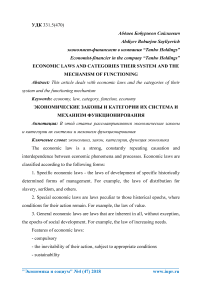Economic laws and categories their system and the mechanism of functioning
Автор: Abdiyev B.S.
Журнал: Экономика и социум @ekonomika-socium
Статья в выпуске: 4 (47), 2018 года.
Бесплатный доступ
This article deals with economic laws and the categories of their system and the functioning mechanism
Economy, law, category, function
Короткий адрес: https://sciup.org/140236559
IDR: 140236559
Текст научной статьи Economic laws and categories their system and the mechanism of functioning
The economic law is a strong, constantly repeating causation and interdependence between economic phenomena and processes. Economic laws are classified according to the following forms:
-
1. Specific economic laws - the laws of development of specific historically determined forms of management. For example, the laws of distribution for slavery, serfdom, and others.
-
2. Special economic laws are laws peculiar to those historical epochs, where conditions for their action remain. For example, the law of value.
-
3. General economic laws are laws that are inherent in all, without exception, the epochs of social development. For example, the law of increasing needs.
Features of economic laws:
-
- compulsory
-
- the inevitability of their action, subject to appropriate conditions
-
- sustainability
-
- constancy, manifested in their repetition.
Economic laws do not act automatically, not on their own. They express the essence, determine the general direction of economic activity. Economic laws are manifested through the subjective activity of people whose actions are conditioned by objective circumstances. The use of economic laws is that people must correlate their actions with their requirements in business practices. Economic categories are logical concepts that reflect the most common and significant aspects of economic phenomena and processes.
Economic reality consists of a huge number of facts, learning that economic theory uses different methods (from the Greek - the way of research) of scientific knowledge:
-
- dialectical method - all phenomena and processes of economic life are considered in interrelation and continuous development;
-
- the method of scientific abstraction - consists in the purification of the object of investigation from random, temporary features and the identification of permanent, characteristic properties;
-
- the method of analysis and synthesis - in the process of analysis, the object of research is divided into parts and sides, and their separate research is carried out, the synthesis is the combination of disparate parts into a whole, helps to see the interaction of the elements identified in the analysis;
-
- method of induction - based on the analysis of factual material, economic laws and theories are derived;
-
- the method of deduction - the reverse process, when the hypothesis put forward is checked by studying the facts of economic reality;
-
- statistical observation - data collection by certain criteria with a certain frequency (periodicity);
-
- economic modeling - possibly in verbal, graphical or mathematical form, makes it possible to predict the development of the processes under study and to
evaluate the possible outcome on the basis of known conditions and the logic of the behavior of the elements of the economic system;
-
- the statement of economic experiments is a rather complicated process, because economic phenomena do not exist in isolation, but are manifested in the whole variety of socio-economic phenomena and are related to the interests of people. The general scientific methods of cognition used in economic theory are: -historical - phenomena and events are considered in the inherent sequence of historical development, - logical - the correct application of universally valid forms of thought (concept, judgment, inference, etc.) Using the unity of historical and logical research methods, economic theory considers economic processes in the historical sequence of their emergence and logical interrelation. In terms of the level of study of economic processes The economic theory is divided into macroeconomics (the behavior of individual economic entities) and microeconomics (the behavior or functioning of the national economic system as a whole). It also includes mesoeconomics (the behavior of individual subsystems of the national economy or sectors of the economy) and super macroeconomics or megaeconomics (the behavior of the world economy as a whole).
Список литературы Economic laws and categories their system and the mechanism of functioning
- Адашев А. Ў. КОРХОНАЛАРДА ИННОВАЦИОН РИВОЖЛАНИШИНИНГ ТАРКИБИЙ АСОСЛАРИ//Научное знание современности. -2017. -№. 4. -С. 8-12.
- Адашев А. У., Аскаралиев А. СОВРЕМЕННЫЕ ПОДХОДЫ К ПОКАЗАТЕЛЯМ И ЦЕННОСТЯМ ЭКОНОМИЧЕСКОГО РАЗВИТИЯ//Теория и практика современной науки. -2017. -№. 2. -С. 28-30.
- Шакирова Г. Ш. Повышение эффективности корпоративного управления на предприятиях в условиях модернизации экономики//Молодой ученый. -2014. -№. 8. -С. 635-636.
- Шакирова Г. Ш. Некоторые вопросы совершенствования корпоративного управления в Узбекистане//Молодой ученый. -2015. -№. 10. -С. 848-850.
- Шакирова Г. Ш. Мотивация труда работников в сфере деятельности малого бизнеса и частного предпринимательства//Молодой ученый. -2016. -№. 11. -С. 1074-1076.
- Шакирова Г. Ш. МИЛЛИЙ ИҚТИСОДИЁТ ТАРАҚҚИЁТИДА ХОРИЖИЙ ИНВЕСТИЦИЯЛАРНИНГ ЎРНИ//Научное знание современности. -2017. -№. 4. -С. 405-407


